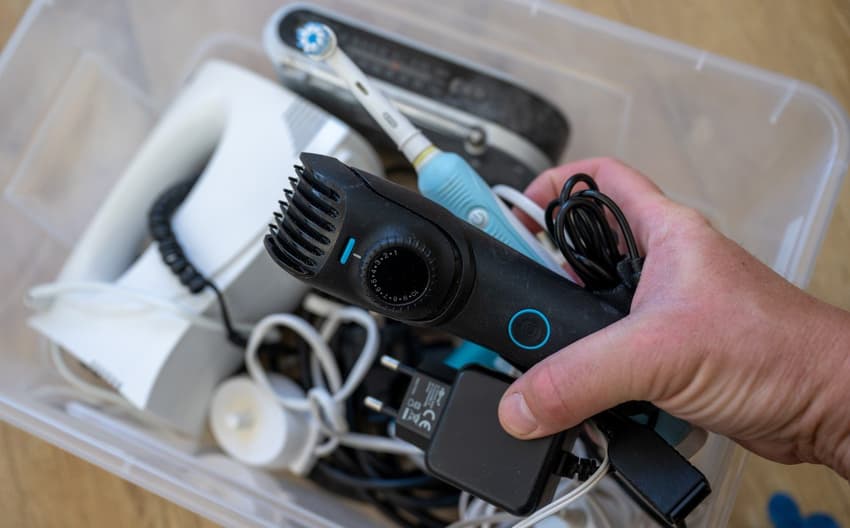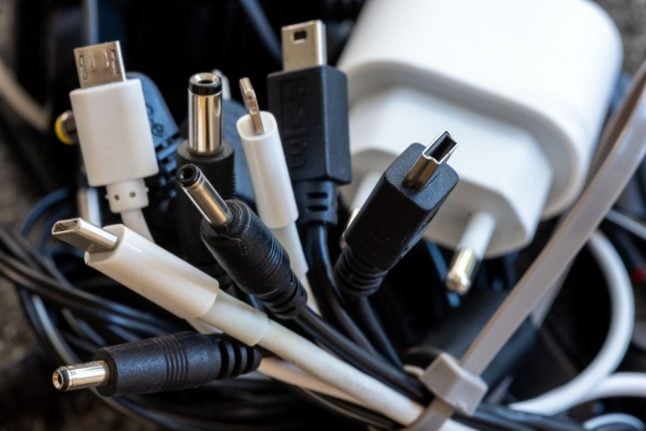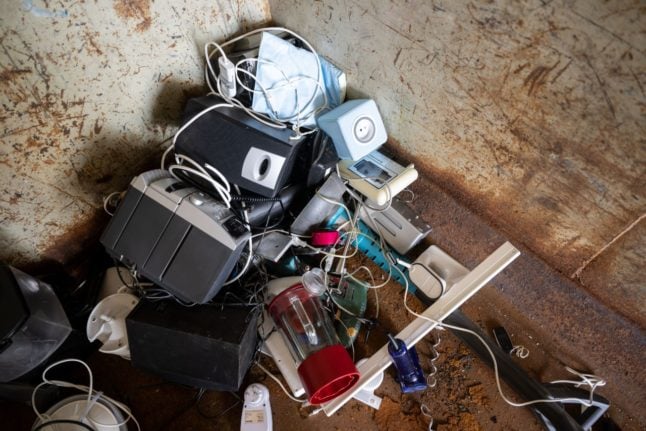EXPLAINED: How to get rid of your old electronics in Germany

Battered old smartphones, ten-year old laptops and printers that have long since given up the ghost - these days everyone has at least one cupboard full of old electronics. But what's the best way to get rid of them in Germany? We tell you how.
Out with the old, in with the new - that tends to be the motto when it comes to our electronics. But after picking up a new gadget or appliance in the Cyber Monday sales, it can be a real headache to dispose of the old one.
If you live in Germany, there are plenty of options available for getting rid of old electronics without sending them to the landfill. Here are a few relatively easy ways to rid yourself of any used phones, laptops or coffee machines that are gathering dust in your cupboards.
Take them to your local supermarket
Since July this year, thanks to a change in the law, supermarkets and discounters have become handy drop-off spots for used electronics. Smaller items like old torches, phones, electric razers and phones are taken for free, while larger items are taken when a new item is purchased.
The new law was intended to encourage better recycling habits by making it as easy as possible to get rid of old electronics. However, major retailers like Rewe and Aldi have reported that not many people have made use of the service so far.
Environmental campaigners say this is because the service tends to be poorly advertised and not entirely user-friendly. But with supermarkets offering one of the most convenient options for disposing of your old phones or bulbs, it may pay to be a little bit pushy and find out how the process works at your nearest store.
Here are a few rules and tips to know beforehand:
- Smaller shops with a less than 800 square-metre retail area aren't obligated to take old electronics, but may do voluntarily.
- Items should generally be less than 25 cm in length to be accepted without charge, so generally things like small lamps, phones and hairdryers are all covered.
- If items exceed this size, supermarkets must take the old device back when a new one is purchased.
- Don't fancy lugging your old microwave or dishwasher to the store? Online retailers also offer an exchange as standard when you purchase a new item from them, and will usually collect the old item when dropping off the new one.
- You don't have to have bought your item from the retailer you drop it off at. As long as they sell some type of electronics, you're well within your rights to dispose of your old items there.
- Generally you're restricted to dropping off a maximum of three items at a time.
Return them to an electronics shop
Just like supermarkets and discounters, electronics shops like MediaMarkt and Saturn are legally obliged to take old electronic equipment off your hands.
Here, the rules are pretty much the same as above, except that in the case of specialist electronics shops, the retail space doesn't have to be as large as for supermarkets. In fact, any electronics dealer near you with a retail floor space of at least 400 square metres will be covered under the new law.
Once again, up to three small items will generally be recycled for you for free, while larger items can be disposed of if you buy a new item of a similar value or type.
Sell them or trade them in
If your old smartphone or laptop is in a relatively good condition, it could be worth trying to sell it online second-hand. Places like Ebay, Facebook Marketplace and Ebay Kleinanzeigen can be good options for listing items like this, but there are plenty of online marketplaces to choose from.
There are also plenty of online companies that will buy your old phones (and occasionally other electronic goods) in order to repair them and/or sell them on. Generally you fill in an online form on their website, get an initial quote for your item, send it off and get the money transferred to your account.

Old wires and chargers in a German households. Photo: picture alliance/dpa | Jens Büttner
This can be a good option if you're not too worried about getting the best possible price for your old item and want to avoid the hassle of selling it yourself.
However, it's worth noting that the price you're quoted isn't always the price you'll get, since items are normally valued after they arrive. You're also not likely to get as much as you would do by selling it directly, since the intermediaries make their money by taking a cut.
One other option is to do things the old-school way, by sticking up a flyer in your neighbourhood advertising a few of your old items or by taking them to a local second-hand/repair shop. The key phrase to look for here is "an und verkauf" (purchase and sale) and the keyword "Elektrogeräte" (electronic devices). This may take a bit more effort but does give you a chance to meet people in your local community.
READ ALSO: How to master second-hand shopping like a German
Donate them to a charity or social project
Local social projects and charities are always keen to take items that are in a usable condition, and this can be a great way to dispose of your item in both a socially and environmentally conscious way.
You can Google "Sozialkaufhaüser" to see if there are some places in your area that might accept your items, and some may even offer a collection service.
Another option, particularly with smartphones, is to donate them to an organisation who will repair and sell them to help fund charitable work. These tend to be environmental charities or projects like Deutsche Umwelthilfe, Naturschutzbund Deutschland and Pro Wildlife.
Of course, you can also choose to give them away yourself to friends and family or via an online marketplace. However, it's best not to take the easy option of shoving your old devices in a box marked 'Zu verschenken' and dumping on the street. Not only can the devices get easily weather damaged, but it may also be considered fly-tipping and could land you a hefty fine.
There are also so-called "repair cafes" where hobby tinkerers help people fix up old items. Even if your old phone is barely usable, they may well be happy to take it and use it for spare parts. One person's junk is another person's treasure, right?
Recycling them at a waste disposal centre
If all else fails, every medium-sized or large German town should have at least one Recyclinghof or Wertstoffhof, where unwanted items like old furniture and electronics can all recycled.
You can generally find these online on Google Maps or by asking a neighbour where your nearest one is. The main benefit of doing things this way is that there won't be any caps on the size or quantity of items you can take to the tip: just bring everything you need to get rid of there and the staff will be able to tell you where to put it.

Old electronics at a recycling centre in Stuttgart. Photo: picture alliance/dpa | Marijan Murat
The downside is that the Recyclinghof may be some distance from your home, and it can be a big hassle to take your old electronics there - especially if you don't own a car.
If you have a large electronic device such as a fridge or washing machine that needs recycling and don't need to purchase a new one anytime soon, you can try and have it picked up by the council.
Most towns in Germany used to do this for free at least twice a year, but now you'll generally have to pay a fee, which depends on the size of the item.
READ ALSO: Reader question: How do I dispose of unwanted furniture in Germany?
What about batteries and light bulbs?
Those are surprisingly easy to get rid of.
Pretty much all supermarkets and drug stores in Germany will have a box somewhere near the entrance or cashiers where you can drop off these small electronic goods at no cost.
Comments
See Also
Out with the old, in with the new - that tends to be the motto when it comes to our electronics. But after picking up a new gadget or appliance in the Cyber Monday sales, it can be a real headache to dispose of the old one.
If you live in Germany, there are plenty of options available for getting rid of old electronics without sending them to the landfill. Here are a few relatively easy ways to rid yourself of any used phones, laptops or coffee machines that are gathering dust in your cupboards.
Take them to your local supermarket
Since July this year, thanks to a change in the law, supermarkets and discounters have become handy drop-off spots for used electronics. Smaller items like old torches, phones, electric razers and phones are taken for free, while larger items are taken when a new item is purchased.
The new law was intended to encourage better recycling habits by making it as easy as possible to get rid of old electronics. However, major retailers like Rewe and Aldi have reported that not many people have made use of the service so far.
Environmental campaigners say this is because the service tends to be poorly advertised and not entirely user-friendly. But with supermarkets offering one of the most convenient options for disposing of your old phones or bulbs, it may pay to be a little bit pushy and find out how the process works at your nearest store.
Here are a few rules and tips to know beforehand:
- Smaller shops with a less than 800 square-metre retail area aren't obligated to take old electronics, but may do voluntarily.
- Items should generally be less than 25 cm in length to be accepted without charge, so generally things like small lamps, phones and hairdryers are all covered.
- If items exceed this size, supermarkets must take the old device back when a new one is purchased.
- Don't fancy lugging your old microwave or dishwasher to the store? Online retailers also offer an exchange as standard when you purchase a new item from them, and will usually collect the old item when dropping off the new one.
- You don't have to have bought your item from the retailer you drop it off at. As long as they sell some type of electronics, you're well within your rights to dispose of your old items there.
- Generally you're restricted to dropping off a maximum of three items at a time.
Return them to an electronics shop
Just like supermarkets and discounters, electronics shops like MediaMarkt and Saturn are legally obliged to take old electronic equipment off your hands.
Here, the rules are pretty much the same as above, except that in the case of specialist electronics shops, the retail space doesn't have to be as large as for supermarkets. In fact, any electronics dealer near you with a retail floor space of at least 400 square metres will be covered under the new law.
Once again, up to three small items will generally be recycled for you for free, while larger items can be disposed of if you buy a new item of a similar value or type.
Sell them or trade them in
If your old smartphone or laptop is in a relatively good condition, it could be worth trying to sell it online second-hand. Places like Ebay, Facebook Marketplace and Ebay Kleinanzeigen can be good options for listing items like this, but there are plenty of online marketplaces to choose from.
There are also plenty of online companies that will buy your old phones (and occasionally other electronic goods) in order to repair them and/or sell them on. Generally you fill in an online form on their website, get an initial quote for your item, send it off and get the money transferred to your account.

This can be a good option if you're not too worried about getting the best possible price for your old item and want to avoid the hassle of selling it yourself.
However, it's worth noting that the price you're quoted isn't always the price you'll get, since items are normally valued after they arrive. You're also not likely to get as much as you would do by selling it directly, since the intermediaries make their money by taking a cut.
One other option is to do things the old-school way, by sticking up a flyer in your neighbourhood advertising a few of your old items or by taking them to a local second-hand/repair shop. The key phrase to look for here is "an und verkauf" (purchase and sale) and the keyword "Elektrogeräte" (electronic devices). This may take a bit more effort but does give you a chance to meet people in your local community.
READ ALSO: How to master second-hand shopping like a German
Donate them to a charity or social project
Local social projects and charities are always keen to take items that are in a usable condition, and this can be a great way to dispose of your item in both a socially and environmentally conscious way.
You can Google "Sozialkaufhaüser" to see if there are some places in your area that might accept your items, and some may even offer a collection service.
Another option, particularly with smartphones, is to donate them to an organisation who will repair and sell them to help fund charitable work. These tend to be environmental charities or projects like Deutsche Umwelthilfe, Naturschutzbund Deutschland and Pro Wildlife.
Of course, you can also choose to give them away yourself to friends and family or via an online marketplace. However, it's best not to take the easy option of shoving your old devices in a box marked 'Zu verschenken' and dumping on the street. Not only can the devices get easily weather damaged, but it may also be considered fly-tipping and could land you a hefty fine.
There are also so-called "repair cafes" where hobby tinkerers help people fix up old items. Even if your old phone is barely usable, they may well be happy to take it and use it for spare parts. One person's junk is another person's treasure, right?
Recycling them at a waste disposal centre
If all else fails, every medium-sized or large German town should have at least one Recyclinghof or Wertstoffhof, where unwanted items like old furniture and electronics can all recycled.
You can generally find these online on Google Maps or by asking a neighbour where your nearest one is. The main benefit of doing things this way is that there won't be any caps on the size or quantity of items you can take to the tip: just bring everything you need to get rid of there and the staff will be able to tell you where to put it.

The downside is that the Recyclinghof may be some distance from your home, and it can be a big hassle to take your old electronics there - especially if you don't own a car.
If you have a large electronic device such as a fridge or washing machine that needs recycling and don't need to purchase a new one anytime soon, you can try and have it picked up by the council.
Most towns in Germany used to do this for free at least twice a year, but now you'll generally have to pay a fee, which depends on the size of the item.
READ ALSO: Reader question: How do I dispose of unwanted furniture in Germany?
What about batteries and light bulbs?
Those are surprisingly easy to get rid of.
Pretty much all supermarkets and drug stores in Germany will have a box somewhere near the entrance or cashiers where you can drop off these small electronic goods at no cost.
Join the conversation in our comments section below. Share your own views and experience and if you have a question or suggestion for our journalists then email us at [email protected].
Please keep comments civil, constructive and on topic – and make sure to read our terms of use before getting involved.
Please log in here to leave a comment.